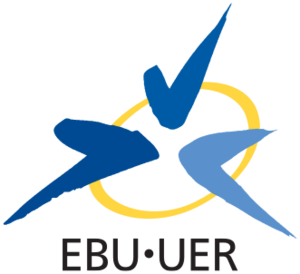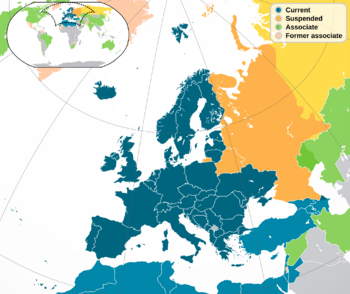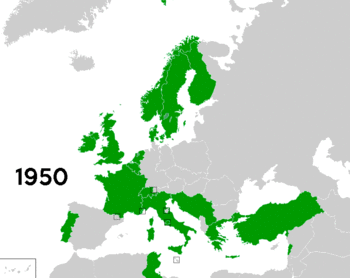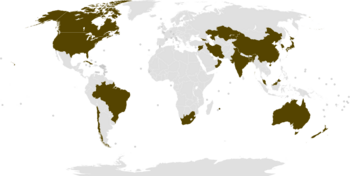European Broadcasting Union facts for kids
|
Union européenne de radio-télévision
|
|

Logo since 2012
|
|
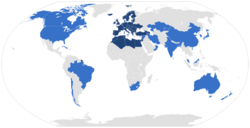
Countries with one or more members are in dark blue. Associated members in light blue. Suspended members in yellow.
|
|
| Predecessor | International Broadcasting Union |
|---|---|
| Formation | 12 February 1950 |
| Type | Union of broadcasting organisations |
| Headquarters | Geneva, Switzerland |
|
Membership
|
|
|
Official language
|
English, French |
|
President
|
Delphine Ernotte |
|
Director-General
|
Noel Curran |
The European Broadcasting Union (EBU) is a big group of public media organizations. These organizations are mostly in Europe. They work together to share TV and radio shows. As of 2024, the EBU has 123 member organizations from 56 countries. It also has 31 associate members from 20 other countries. The EBU started in 1950. Its main office is in Geneva, Switzerland.
The EBU runs the Eurovision and Euroradio networks. These networks help send live TV and radio broadcasts to its members. The EBU also helps members share breaking news videos every day. In 2017, they started a service called Eurovision Social Newswire. This service checks and shares news videos found on social media.
The EBU works with its members to create shows and events. The most famous event is the Eurovision Song Contest. They also organize the Eurovision Debates. These debates are for candidates running for president of the European Commission. Noel Curran has been the Director-General since 2017.
Contents
What the EBU Does
EBU members are public service media (PSM) broadcasters. This means they are set up by law. They are independent and work for the good of everyone in society. They do not take sides in politics.
EBU members come from many different countries. These include Iceland in the north and Egypt in the south. They also come from Ireland in the west and Azerbaijan in the east. Most countries in Europe are members. Some associate members are from the United States. These include ABC, CBS, NBC, and NPR.
To be a member, a media organization must be in a country within the European Broadcasting Area. This area is defined by the International Telecommunication Union. Or, the country must be a member of the Council of Europe.
Members get many benefits:
- They can access special sports events. They also get news, music, and kids' shows.
- The EBU speaks for them in places like Brussels. This helps make sure laws and rules are good for broadcasters.
- Members can share ideas and learn from each other. They do this through meetings, workshops, and training.
- The EBU is a place for learning about new technology. Experts give advice and guidance on new ideas.
The most famous event the EBU produces is the Eurovision Song Contest. The EBU also organizes the Junior Eurovision Song Contest. Other events include the Eurovision Young Musicians competition.
For radio, the EBU helps with shows like Euroclassic Notturno. This is an overnight classical music stream. It is produced by BBC Radio 3. They also have special theme days, like Christmas music relays from across Europe. The EBU is part of the International Music Council.
Many EBU broadcasters have deals for big sports events. These include the FIFA World Cup. Another event broadcast across Europe is the Vienna New Year's Concert.
Eurovision Media Services is the business part of the EBU. It provides media services to many organizations and sports groups worldwide.
Special Music for Shows
The music played before and after EBU broadcasts is Prelude to Te Deum by Marc-Antoine Charpentier. You can hear it before and after the Eurovision Song Contest. It is also played for other important events.
EBU's History
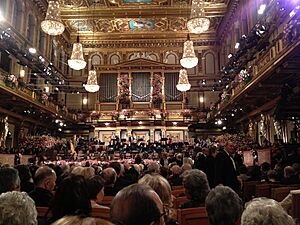
The EBU took over from an older group called the International Broadcasting Union (IBU). The IBU started in 1925. It helped members share programs and solve technical problems. During World War II, the IBU was taken over by Nazi Germany. After the war, the Allies did not trust it.
In 1946, the Soviet radio committee suggested forming a new group. But there were disagreements. Some countries worried that the Soviet Union would have too much power. Britain also felt it would not have enough say.
On June 27, 1946, a different group called the International Broadcasting Organisation (IBO) was formed. Many IBU members left to join the IBO. For a while, both groups tried to organize radio frequencies. Britain decided not to join either.
Later, Western European countries decided to form a new organization. The BBC suggested it be based in London. On February 13, 1950, the European Broadcasting Union had its first meeting. It had 23 members. The first president was Ian Jacob from the BBC. The BBC played a big role in the EBU's early days. The main difference was that EBU members were broadcasters, not governments. West German broadcasters joined in 1951. The EBU also worked with its Eastern counterpart, the International Radio and Television Organisation (OIRT). These two groups worked side-by-side until they merged in 1993.
In 1967, the first concert in the EBU's International Concert Season was broadcast. It came from the Queen Elizabeth Hall in London.
How EBU Uses Technology
The EBU's technical work helps its members with new technology. They share information through meetings and written guides. This includes the EBU Technical Review magazine.
The EBU also encourages members to work together. They share what they know and their experiences. This helps them achieve more than they could alone. They have groups that study specific technical issues. For example, they have been preparing for changes to how radio frequencies are used.
The EBU strongly supports using open standards. These are common rules for technology. Using open standards helps different products work together. It also makes it easier for EBU members to share programs. This benefits everyone who watches or listens.
EBU members and the EBU Technical Department have helped create many systems used in TV and radio. These include:
- The AES/EBU digital audio interface, known as AES3.
- Ways to connect digital video, like ITU-R Recommendations 601 and 656.
- RDS, which sends data on FM radio.
- The EBU Loudness Recommendation R 128, which helps keep sound levels consistent.
The EBU has also helped develop:
- Digital radio (DAB) through projects like Eureka Project 147.
- DVB (Digital Video Broadcasting) for digital TV.
- Digital radio for AM broadcasting through Digital Radio Mondiale (DRM).
- Standards for PVR systems through the TV-Anytime Forum.
- Ways to share content online using P2PTV.
EBU Members
Current Members
As of June 2024, the EBU has 75 broadcasting companies from 56 countries.
| Country | Broadcasting organisation | Abbr. | Year |
|---|---|---|---|
| Albanian Radio-Television (Radio Televizioni Shqiptar) | RTSH | 1999 | |
| Public Establishment of Television (المؤسّسة العمومية للتلفزيون, Établissement public de télévision) | EPTV | 1970 | |
| National Sound Broadcasting Company (المؤسسة العمومية للبث الإذاعي, Entreprise nationale de radiodiffusion sonore) | ENRS | ||
| Algerian Broadcasting Company (البث الإذاعي والتلفزي الجزائري, Télédiffusion d'Algérie) | TDA | ||
| Radio and Television of Andorra (Ràdio i Televisió d'Andorra) | RTVA | 2002 | |
| Public Television Company of Armenia (Հայաստանի Հանրային Հեռուստաընկերություն, Hayastani Hanrayin Herrustaynkerut'yun) | ARMTV ՀՀՀ |
2005 | |
| Public Radio of Armenia (Հայաստանի Հանրային Ռադիո, Hayastani Hanrayin Radio) | ARMR | ||
| Österreichischer Rundfunk | ORF | 1953 | |
İctimai Televiziya və Radio Yayımları Şirkəti:
|
İCTI/İTV | 2007 | |
| Vlaamse Radio- en Televisieomroeporganisatie | VRT | 1950 | |
| Radio-Télévision Belge de la Communauté Française | RTBF | ||
| Radio and Television of Bosnia and Herzegovina (Bosanskohercegovačka radiotelevizija) | BHRT | 1993 | |
| Bulgarian National Radio (Българско национално радио, Bǎlgarsko nacionalno radio) | BNR БНР |
1993 | |
| Bulgarian National Television (Българска национална телевизия, Balgarska natsionalna televizia) | BNT БНТ |
||
| Croatian Radiotelevision (Hrvatska radiotelevizija) | HRT | 1993 | |
| Cyprus Broadcasting Corporation (Ραδιοφωνικό Ίδρυμα Κύπρου, Radiofonikó Ídryma Kýprou, Kıbrıs Radyo Yayın Kurumu) | CyBC ΡΊΚ RKYK |
1969 | |
| Český rozhlas | ČRo | 1993 | |
| Česká televize | ČT | ||
| Danmarks Radio | DR | 1950 | |
| TV2 Danmark | DK/TV2 | 1989 | |
| National Media Authority (الهيئة الوطنية للإعلام) | NTU | 1985 | |
Eesti Rahvusringhääling:
|
ERR | 1993 | |
| Yleisradio (Rundradion) | Yle | 1950 | |
Groupe de Radiodiffusion Française:
|
GRF | 1950 | |
| Arte | ARTE | 2024 | |
| Georgian Public Broadcaster (საქართველოს საზოგადოებრივი მაუწყებელი, sakartvelos sazogadoebrivi mauts'q'ebeli) | GPB სსმ |
2005 | |
| Arbeitsgemeinschaft der öffentlich-rechtlichen Rundfunkanstalten der Bundesrepublik Deutschland (The Working Group of Public Broadcasters in the Federal Republic of Germany, ARD):
|
ARD | 1952 | |
| Zweites Deutsches Fernsehen (Second German Television) | ZDF | 1963 | |
| Hellenic Broadcasting Corporation (Ελληνική Ραδιοφωνία Τηλεόραση, Ellinikí Radiofonía Tileórasi) | ERT | 1950–2013, 2015 |
|
Médiaszolgáltatás-támogató és Vagyonkezelő Alap (Media Support and Asset Management Fund):
|
MTVA | 2014 | |
| Ríkisútvarpið | RÚV | 1956 | |
| Raidió Teilifís Éireann | RTÉ | 1950 | |
| TG4 | TG4 | 2007 | |
| Israeli Public Broadcasting Corporation (תַּאֲגִיד הַשִׁיְדּוּר הַיִשְׂרָאֵלִי, Taʾăḡid HaŠidûr HaYiśrāʾēli) (هَيْئَة اَلْبَثّ اَلْإِسْرَائِيلي, Hayʾat al-Baṯṯ al-Isrāʾīlī) | KAN | 2017 | |
| RAI – Radiotelevisione Italiana | RAI | 1950 | |
| Jordan Radio and Television Corporation (مؤسسة الإذاعة والتلفزيون الأردني) | JRTV | 1970 | |
Public Broadcasting of Latvia (Latvijas Sabiedriskie mediji):
|
LSM | 1993 | |
| Télé Liban (تلفزيون لبنان) | TL | 1950 | |
| Libya National Channel (قناة ليبيا الوطنية) | LNC | 2011 | |
| Lithuanian National Radio and Television (Lietuvos nacionalinis radijas ir televizija) | LRT | 1993 | |
| RTL Group | RTL | 1950 | |
| Média de service public 100,7 | MSP | 2022 | |
| Public Broadcasting Services | PBS | 1970 | |
| Compania Națională "Teleradio-Moldova" | TRM | 1993 | |
| Monaco Media Diffusion | MMD | 1994 | |
| TVMonaco | TVM | 2024 | |
| Radio i televizija Crne Gore (Радио и телевизија Црне Горе) | RTCG РТЦГ |
2006 | |
| Société Nationale de Radiodiffusion et de Télévision (الشَرِكَة الوَطَنِيَّة لِلْإِذَاعَة وَالتَلْفَزَة, ⵜⴰⵎⵙⵙⵓⵔⵜ ⵜⴰⵏⴰⵎⵓⵔⵜ ⵏ ⵓⵏⵣⵡⴰⵢ ⴷ ⵜⵉⵍⵉⴼⵉⵣⵢⵓⵏ) | SNRT | 1950 | |
Nederlandse Publieke Omroep (Dutch Public Broadcaster):
|
NPO | 1950 | |
| Macedonian Radio Television (Македонска Радио Телевизиjа, Makedonska radio televizija) | MRT МРТ |
1993 | |
| Norsk Rikskringkasting | NRK | 1950 | |
| TV 2 Group (TV 2 Gruppen) | NO/TV2 | 1993 | |
| Telewizja Polska | TVP | 1993 | |
| Polskie Radio | PR | ||
| Rádio e Televisão de Portugal | RTP | 1950 | |
| Societatea Română de Radiodifuziune | ROR | 1993 | |
| Societatea Română de Televiziune | RO/TVR | ||
| San Marino RTV | SMRTV | 1995 | |
| Radio-televizija Srbije (Радио-телевизија Србије) | RTS | 2006 | |
| Slovak Television and Radio (Slovenská televízia a rozhlas) | STVR | 2024 | |
| Radiotelevizija Slovenija | RTVSLO | 1993 | |
| Radiotelevisión Española | RTVE | 1955 | |
Sveriges Rundradiotjänst:
|
SRT | 1950 | |
Swiss Broadcasting Corporation:
|
SRG SSR | 1950 | |
| Établissement de la Radio Tunisienne (مؤسسة الإذاعة التونسية) | RTT | 2007 | |
| Établissement de la Télévision Tunisienne (مؤسسة التلفزة التونسية) | |||
| Türkiye Radyo ve Televizyon Kurumu | TRT | 1950 | |
| National Public Broadcasting Company of Ukraine (Національна суспільна телерадіокомпанія України, Natsionalna Suspilna Teleradiokompaniya Ukrayiny) |
SU | 1993 | |
| British Broadcasting Corporation | BBC | 1950 | |
United Kingdom Independent Broadcasting:
|
UKIB | 1981 | |
| Vatican Radio (Radio Vaticana, Statio Radiophonica Vaticana) | VR | 1950 |
Suspended Members
| Country | Broadcasting organisation | Abbr. | Year | Suspended |
|---|---|---|---|---|
| National State TV and Radio Company of the Republic of Belarus | BTRC | 1993 | 2021 | |
| Channel One Russia | C1R | 1996 | 2022 | |
| All-Russia State Television and Radio Broadcasting Company | RTR | 1993 | ||
Radio Dom Ostankino:
|
RDO | 1996 |
Associate Members
An associate member is a group or organization from a country that is part of the International Telecommunication Union. They provide radio or TV services outside the main European Broadcasting Area. They can apply to be an Associate Member of the EBU.
Associate members usually do not get to join Eurovision events. However, there are some special exceptions. For example, Australia has been in the Eurovision Song Contest since 2015. They also participated in the Junior Eurovision Song Contest from 2015 to 2019. Canada was in the Eurovision Young Dancers from 1987 to 1989. Kazakhstan participated in the Junior Eurovision Song Contest from 2018 to 2022. These countries were invited to join these specific events.
As of December 2023, there are 31 associate members from 20 countries.
| Country | Broadcasting organisation | Abbr. | Year |
|---|---|---|---|
| Australian Broadcasting Corporation | ABC | 1950 | |
| FreeTV Australia | Free | 1962 | |
| Special Broadcasting Service | SBS | 1979 | |
| Bangladesh Television | BTV | 1974 | |
| TV Cultura (Fundação Padre Anchieta) | FPA | 2012 | |
| Canadian Broadcasting Corporation (Société Radio-Canada) | CBC | 1950 | |
| Canal 13 | C13 | 1971 | |
| China Media Group (中央广播电视总台) | CMG | 2010 | |
| Shanghai Media Group (上海文化廣播影視集團有限公司) | SMG | 2016 | |
| Cuban Institute of Radio and Television (Instituto Cubano de Radio y Televisión) | ICRT | 1992 | |
| Teleimedi | TEME | 2004 | |
| Rustavi 2 (რუსთავი 2) | RB | 2003 | |
| Radio Television Hong Kong (香港電台) | RTHK | 1983 | |
| Islamic Republic of Iran Broadcasting (صدا و سيمای جمهوری اسلامی ايران) | IRIB | 1968 | |
| Nippon Hōsō Kyōkai (日本放送協会) | NHK | 1951 | |
| TBS Holdings (TBSホールディングス) | TBS | 2000 | |
| Khabar Agency ("Хабар" Агенттігі, Агентство «Хабар») | KA | 2016 | |
| Radio Television of Malaysia (Radio Televisyen Malaysia, راديو تيليۏيشن مليسيا) | RTM | 1970 | |
| Mauritius Broadcasting Corporation | MBC | 1980 | |
| Association of Community Radio Broadcasters Nepal | ACORAB | 2023 | |
| Radio New Zealand (Te Reo Irirangi o Aotearoa) | RNZ | 1950 | |
| Television New Zealand (Te Reo Tātaki o Aotearoa) | TVNZ | 1980 | |
| Public Authority for Radio and TV of Oman | PART | 1976 | |
| Korean Broadcasting System (한국방송공사) | KBS | 1974 | |
| General Organization of Radio and TV (Organisation de la Radio-Télévision Arabe Syrienne, الهيئة العامة للإذاعة والتلفزيون – سورية) |
ORTAS | 1978 | |
| American Broadcasting Company | ABC | 1959 | |
| American Public Media | APM | 2004 | |
| Columbia Broadcasting System | CBS | 1956 | |
| National Public Radio | NPR | 1971 | |
| National Broadcasting Company | NBC | 1953 | |
| WFMT Radio Network | WFMT | 1980 |
Approved Participant Members
Some groups or organizations from countries that are part of the International Telecommunication Union do not qualify as full or associate members. However, if they provide broadcasting activities for the EBU, they can become Approved Participants. This membership lasts about five years. They can apply for this status at any time by paying a yearly fee.
As of November 2024, these eight EBU broadcast members are Approved Participants:
| Country | Broadcasting organisation | Abbr. |
|---|---|---|
| Euronews | EURONEWS | |
| Institut national de l'audiovisuel | INA | |
| TV5Monde | TV5 | |
| JP Makedonska Radiodifuzija | JP MRD | |
| Radio Television of Vojvodina | RTV | |
| Catalunya Música | CAT | |
| Cellnex | CELLNEX |
Events Organized by EBU
The EBU works with host broadcasters to organize competitions and events. EBU members can choose to participate in these events.
Eurovision Song Contest

The Eurovision Song Contest is a yearly international song competition for EBU members. It first took place in Lugano, Switzerland, on May 24, 1956. Seven countries participated, each with two songs. This was the only contest where countries could have more than one song. Since 1957, each country has had only one entry. Switzerland won the first contest in 1956. Austria won the most recent contest, which was held in Basel, Switzerland.
Let the Peoples Sing
Let the Peoples Sing is a choir competition held every two years. Choirs are chosen from radio recordings sent in by EBU radio members. The final competition has three categories and about ten choirs. It is broadcast live to all EBU members. The winning choir receives the Silver Rose Bowl. The first winner was the Glasgow Phoenix Choir from Scotland in 1961. The most recent winner is the Copenhagen Girls Choir from Denmark in the 2024 competition.
Games Without Borders
Jeux sans frontières (which means "Games Without Borders") was a TV game show across Europe. It was broadcast from 1965 to 1999 with the EBU's help. The original show ended in 1982 but came back in 1988. The revived show had different countries and was hosted by smaller broadcasters.
Eurovision Young Musicians
Eurovision Young Musicians is a competition for European musicians aged 12 to 21. The EBU organizes it. The first competition was held in Manchester, United Kingdom, on May 11, 1982. This TV competition happens every other year. Some countries hold their own national finals to pick their musician. Since 1982, it has become a very important music competition worldwide. Austria won the most recent contest, which took place in Bodø Municipality, Norway.
Eurovision Young Dancers
Eurovision Young Dancers was a dance show broadcast on TV across Europe every two years. The first competition was held in Reggio Emilia, Italy, on June 16, 1985. It is similar to the Eurovision Song Contest. Each country sends a dance act to compete for the title. The competition is for solo dancers. All dancers must be between 16 and 21 years old and not professional dancers. Poland won the most recent contest, which took place in Prague, Czech Republic.
Euroclassic Notturno
Euroclassic Notturno is a six-hour program of classical music recordings. BBC Radio puts it together using music from EBU members. It is sent by satellite to broadcasters for their overnight classical music shows. The recordings are usually from live radio broadcasts, not commercial CDs.
Junior Eurovision Song Contest
The Junior Eurovision Song Contest is a yearly international song competition. It first took place in Copenhagen, Denmark, on November 15, 2003. Sixteen countries participated in the first show, each with one song. Croatia won the first contest in 2003. Georgia won the most recent contest, which was held in Madrid, Spain.
Eurovision Dance Contest
The Eurovision Dance Contest was an international dancing competition. It was first held in London, United Kingdom, on September 1, 2007. Finland won the first contest in 2007. The competition happened again in 2008 in Glasgow, United Kingdom, but has not been held since. Poland won the most recent contest.
Magic Circus Show
The Magic Circus Show was an entertainment show organized by the EBU. It took place in 2010, 2011, and 2012 in Geneva, Switzerland. Children aged 7–14 from eight EBU member countries performed different circus acts. The show was held at the Geneva Christmas Circus. The main show also had the Magic Circus Show Orchestra.
European Sports Championships
The European Sports Championships is a big sports event. It includes some of Europe's top sports. The groups that govern athletics, swimming, cycling, rowing, golf, gymnastics, and triathlon worked together. They combined their individual championships for the first time in 2018. This event was hosted by Berlin, Germany, and Glasgow, United Kingdom.
Olympic Games Coverage
The EBU first showed the Olympic Games in 1956. Historically, they bought the rights to broadcast the Games for their members. The amount the EBU paid grew over time. For example, they paid $22 million for the 1984 Los Angeles Olympics. They paid $240 million for the 1996 Atlanta Olympics. For the 2004 Athens Games, it was $394 million. For the 2010 Vancouver and 2012 London Games, they paid $746 million.
In 2008, the International Olympic Committee (IOC) decided to make deals directly with broadcasters for the 2014-2016 Olympic Games. This was because the EBU did not "offer enough money." The IOC then made separate deals with broadcasters in France, Germany, Italy, Spain, Turkey, and the UK. They sold the rest of the rights to Sportfive for $315 million. The EBU tried to buy the rights for the 2018-2024 Olympic Games. However, in June 2015, the IOC gave the contract to Discovery Communications. The EBU was not happy with this decision. They said it showed the IOC was changing the Olympics from a free-to-watch event to one that people had to pay for.
In January 2023, the IOC announced a new deal. The EBU and Warner Bros. Discovery together won the rights for all Olympic Games from the 2026 Winter Olympics to the 2032 Summer Olympics. This joint bid came after people criticized the 2015 deal with Discovery. Each EBU member will broadcast at least 200 hours of the Summer Olympics. They will also show at least 100 hours of the Winter Olympics. Warner Bros. Discovery will have unlimited rights.
See also
 In Spanish: Unión Europea de Radiodifusión para niños
In Spanish: Unión Europea de Radiodifusión para niños
- African Union of Broadcasting
- Asia-Pacific Broadcasting Union
- Caribbean Broadcasting Union
- Commonwealth Broadcasting Association
- Commonwealth Press Union
- Europe by Satellite
- International Telecommunication Union
- North American Broadcasters Association
- Organización de Telecomunicaciones de Iberoamérica
- Public Broadcasting System
 | Janet Taylor Pickett |
 | Synthia Saint James |
 | Howardena Pindell |
 | Faith Ringgold |




